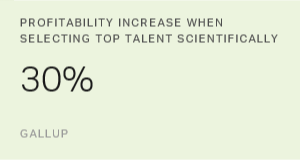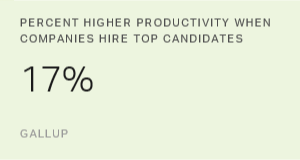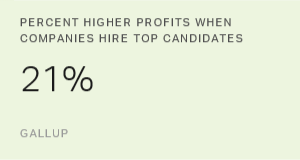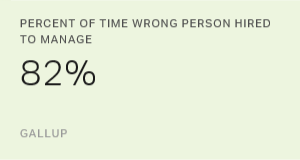Story Highlights
- Talent for a role doesn't necessarily guarantee success
- In certain situations, hiring for experience may be essential
- There's a big difference between key experiences and tenure in a role
This is the second article in a two-part series.
The hiring process can be arduous and costly if organizations make poor hiring decisions.
While companies often learn how to recognize talent, it's nearly impossible to maintain a flawless hiring record. Some companies, however, get pretty close.
Gallup clients that have reached this level of success in hiring follow a similar pattern: They assess people using objective criteria and develop systems to suit their needs. In fact, Gallup meta-analyses suggest that when companies select the top 20% of candidates from talent-based assessments, they achieve, on average, a 30% increase in profitability and a 20% increase in sales, as well as decreases in turnover and unscheduled absences.
One part of those "objective criteria" is a focus on applicants with the innate talent for the job, not just industry experience. It's important that leaders differentiate between true talent for a role and past performance in a previous role.
Gallup defines talent as recurring patterns of thought, feeling or behavior that can be productively applied. However, Gallup understands the reality of managers' hiring needs; sometimes key experiences are critical to job performance.
In an ideal world, there would be an abundance of "purple squirrels" -- the Silicon Valley term for imaginary candidates who possess every possible trait a manager could want. In the real world, however, leaders need to calibrate potential candidates with varying levels of talent and experience. Gallup consultants have developed a series of considerations that can help companies rethink and disrupt their typical -- and often costly and ineffective -- hiring patterns.
Considering the Learning Curve
While talent for a role is an excellent predictor of an employee's potential in that role, it does not guarantee success. In fact, while employees with strong innate abilities eventually outperform their colleagues, job experience may have a greater impact in the first five years in that role, according to Gallup Senior Scientist Frank Schmidt.
Therefore, managers looking to hire someone outside their industry need to take individual learning curves into account. Startups that expect employees to "hit the ground running" or companies that suffer high turnover may need experienced candidates. This is part of why engagement is important. Engaged business units have, on average, 24% less turnover in high-turnover organizations and 59% less turnover in low-turnover organizations. That low churn also allows them to consider less experienced, but more talented employees.
Leaders can ask themselves:
- Can we afford to wait for the more talented candidate to gain the experience he or she needs?
- Do we need someone who can perform the role perfectly on Day One?
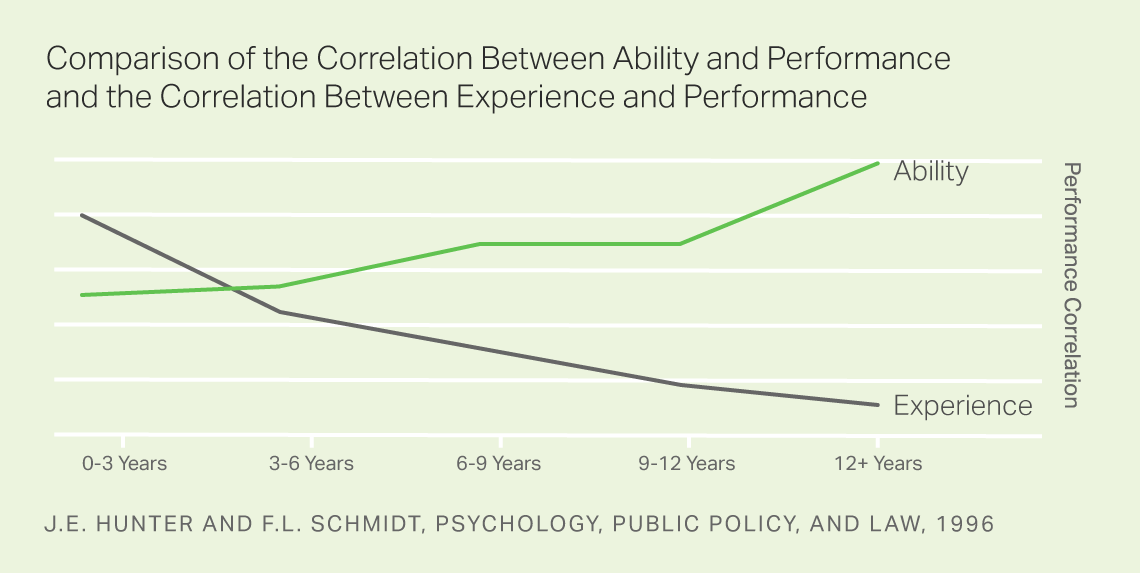
Focusing on Internal Development
Leaders frequently tell Gallup that they want to hire for talent -- but they have positions to fill, and managers don't always know how or have time to develop talent. Meanwhile, employees want opportunities to learn and grow, especially the highest-quality applicants and many millennials. Therefore, companies should consider their internal development capabilities as well as the learning curve of talented, but less-experienced, candidates.
Without a functioning training program, hiring for experience may be essential. Even a well-developed internal learning team may not have the knowledge to teach a specific skill set. If business reasons preclude an organization from training employees, it may be forced to hire only experienced candidates.
Leaders can ask themselves:
- Can our learning teams handle the developmental demands of high-quality candidates?
Determining Key Experiences
There's a big difference between key experiences and tenure in a role. A candidate may have 10 years of managerial experience but no record of accountability for profits and losses. Therefore, it's not the quantity of experience, but the quality of key experiences that allows someone to develop.
There's a simple process for identifying which experiences are key:
- identify your top performers
- determine the key experiences that accelerated their performance
Gallup has performed versions of these predictive analytics for a diverse set of employers, including elite military groups, hospitality companies and leadership teams.
Some of the results are surprising: One hospitality client found that interns who lived in dorms were more likely to complete their internship. Perhaps interacting with other college students in a close-knit environment sharpened their interpersonal talents.
Trainees in an elite military group were considerably more likely to make it through their demanding training program if they had close family members who had also completed the program. It's possible those family members had mentally prepared trainees for the grueling regimen.
In any case, only close examination of top performers showed which experiences were key to performance.
Leaders can ask themselves:
- What key experiences set the best of our workforce apart from the mediocre?
Aptitude for a job is a great predictor of success in that role, but it is not an absolute certainty. Eventually, the best workers will outperform the others -- but only if they receive the time, development and key experiences they need.
